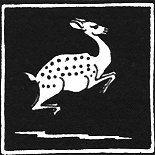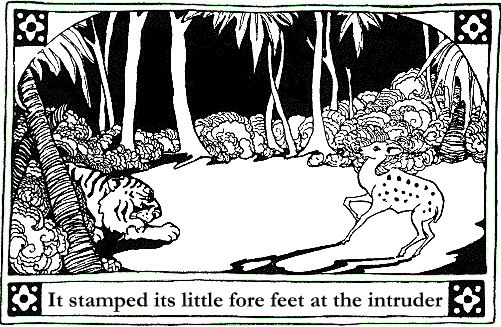 |  |
Wild at Heart Homepage | Contents | Previous Chapter
CHAPTER III
TOLL
1

As Nanga strolled across the grass toward the stream, the picture of which he made the central figure was idyllic in its peace. The warmth of day seemed still to cling to the garden. The apes had begun to play. They were rolling and gamboling about him, while the does stood like shy spectators of the game. Birds were going to roost: peafowl fluttering in the tree-tops; jungle fowl scuffling in the undergrowth; tiny, invisible birds twittering all about. There seemed to be none of the conscious alertness, the tremulous caution that characterizes wild creatures in wild places; and for a few minutes it was conceivable that here they feared nothing, because there was nothing to fear. Then, imperceptibly, there came a change. The peace in the picture gave place to a vague uneasiness.
The sounds in the undergrowth--the patterings, rustlings, beatings of wings--revealed the change. They were staccato, these sounds. They lacked that exquisite complacency that is given only to bees, because bees fear nothing. They seemed now to indicate alarm, the more mysterious because there was no apparent cause for it. It was like the flitting of guests from a forbidden feast--hurried, unseen.
The little creatures of the inner woods had evidently apprehended something--some danger, some presence--which was as yet hidden from the inhabitants of the garden itself. But soon they too felt it. The apes ceased their play. The does shifted restlessly. And Nanga paused, and looked back.
It was instinct rather than chance that carried his eyes to the Ridge at that moment. Black as coal, sharply cut out against the lemon light, the Ridge loomed like a physical menace over the garden. It drew the eyes and dominated that little world, so that the apes and the deer and the naked boy became pygmies, crouching under a somber mountain. Up there nothing stirred except the faint chill wind sweeping through the crannies of the rocks and trees, and carrying with it the almost tangible wraiths of twilight. Sighing it came to them, and in the growing dusk it seemed that the Ridge itself came nearer with it, loomed yet more portentously over them. So, fascinated, they watched the black mass; and, one and all, they listened.
They could hear nothing but that gentle sighing; yet they knew that he was near. Every evening since that far-off time when the apes, huddled together and shivering, had heard the death of a man and a woman on the ground below, he had come down at this time. The sighing of the wind was but the signal of his coming; the darkening of the Ridge foreshadowed always the tiger of the Ridge. It was the price that they paid for the peace of their days, for the long siesta, for the joy of awakening.
Up in the village of Kotahbagh across the river men could tell the same tale.
“His beat,” they would say, “never changes. The same time, the same trail. As the sun reddens he wakes; you can hear his yawn, ‘Aa-oong,’ at waking, but never after, for there is no sound while he walks Maiwani. None know his exact path, and none know the way whereby he descends to the river, save that it lies by an old garden where men do not now go. But that he follows the river down into the deep fens we know, for we have seen his prints in the morning. We know that at midnight he crosses at Chhota Haldi, since the pariah dogs bay him over the ford. And that at dawn he lurks on the fringe of the sal forest behind Piri Ram’s field, to catch the old crones gathering their sticks, we know best of all, for so Dharma Nand lost his grandmother. Wah! but he is bold! The same time ever, the same trail.”
Well enough for the greybeards to wag light heartedly to this tune by a roaring fire up there; but down under Maiwani Ridge they were face to face with a stark fact. In their bones, two-legged and four-legged alike, they all knew it: every evening, in the dusk, in the chill the pestilence must come among them. Sometimes he would take toll; sometimes not. But he would pass, always.
So now they stayed transfixed--Nanga crouching by the stream; the cheetal just across it, in a pale bunch, stamping the ground; the apes, glancing upward, making sure of their line of retreat. It seemed that they had to stay so, that some mysterious law of the wild forbade them to flee. Yet even now there was no sound of the presence, no flicker of movement among the shadows.
Nanga’s eyes shifted uneasily, the whites showing under his black brows. Something told him, as surely as ears or eyes could tell him, that he was being watched. Somewhere among the tumbled rocks that seemed to grow out between him and the sky, under some bush, in some narrow cranny, a great head was resting on ponderous paws; eyes were staring, steady, unwinking; the tip of a long tail was flicking, flicking--
Crash!
The suspense had been too long for the stag: or perhaps a stray whiff of the flesh-eater had drifted to him, for he suddenly stampeded, wheeling with a snort of terror, crashing madly through the undergrowth. At the same instant the does whipped round and followed him, and the banyan-tree was all a-twinkle with the apes’ white tails, Nanga’s brown legs among them. It was as if the very wind had blown the inhabitants of the garden away, so swift and so complete was the rout. Nothing living, it seemed, was left to make a tiger’s meal. Once more he must pass empty from among them, and on into the night. Once more all seemed well.
But all was not well. A shiver of excitement went through the watchers, and they began to chatter excitedly up in the tree; for something living was left--something that had broken off from the cheetal herd and had lost its way. It was the fawn.
Thinking some game was afoot, it had raced merrily through the stream instead of following its mother, and now was scampering round the open clearing as if to show the pride of its long legs. Once, twice it made the circle; then, hearing the frenzied chatter above and realizing that it was alone on the ground, halted suddenly and looked up at the gibbering apes like a perplexed child.
Perhaps, then, it saw something in the shadows: a movement, a glint of a green eyeball, a vague shape of fear; for there was one piteous whimper, hardly heard. Then the end--ugly, horrible.
The terror had come out into the open at last, though with never a sound to herald him. He came in quick little rushes; and after each rush crouched. Whenever he moved he seemed, in that half light, like an enormous snake wriggling at an incredible speed, so close was his belly to the ground and whenever he crouched he seemed all at once to vanish from sight.
But the fawn could see him.

It stood, peering at him, shivering. Once, as if hopeful that this mysterious approach might after all be part of a game, it stamped its little fore feet at the intruder. The next second it was blotted out in grisly, leaping confusion.
To Nanga, sitting in the fork of the tree, twenty feet up, it was as if the shadows below had themselves risen and leaped. He had a vision of a mass, huge and dark, hurtling over the ground; and for one instant this vague bulk took definite shape, so that for all his days he was to carry a picture in his head of sinister stripes, cavernous jaws, and a tail wickedly lashing. Then all was vague again, as the monster bounded over the stream and into the undergrowth; and so unreal did the vision seem that, when it was over, he looked again for the fawn.
But the ground was empty.
2
The clamour of the apes broke out afresh, but their note had changed. There was relief in it; there was almost self-congratulation.
“Toll has been paid,” the silly voices seemed to say, “toll has been paid; what else do fawns exist for? Such a thing is not seen every night.”
They gesticulated. Quite half a dozen pairs proceeded to enact the parts of tiger and fawn for the benefit of the others. But, though the tree was agog with movement, Nanga did not stir from his perch. He sat, hunched up and shivering, and stared at the ground.
Toll had been taken before. Toll would be taken again. He had seen it often and often, and in ways less swift, more cruel than this. In the broad light of day he had seen the red dog worrying a fat doe; had seen the torn and bleeding thing crawling across the river-bed with half the pack on her back in the glaring summer heat. He had sat up in a tree and watched a python swallowing its prey by inches, and he knew of a leopardess that played with her victims as a cat plays with a mouse. The cruelty of the jungle was not hidden from him. Like the rest, he had accepted it, even enjoyed it. He too had played at being a tiger, and his voice had joined the other voices. But--not now.
The voices were silly voices. He wanted to shut his ears. He wanted never to see an ape again.
Soon he would leave them. When they were not looking, he would slip away and cross the river; then he would run into the sal forest on the other side, and never see an ape again.
He did not ask himself why. If he had, there could have been no answer, for his distress was new and formless as yet. Something had stirred depths in him. It might have been the thought of the puny grace of the victim. Or the terror of the destroyer; for he still shivered at the memory of what he had seen. But what brought the hot blood throbbing through his head was the thought of that foolish, empty clamour.
Chatter, chatter, chatter! They could do naught else, day and night. They filled the tree, they filled the world with their noise. Strange, fierce things--rushings and strivings and killings--might happen at their very feet, but they would only chatter on forever.
He hated them.
Perhaps he yearned to think, and did not know how to think clearly. At least he yearned to be alone, and with a greater urgency than he had ever before felt; for his den, where his baubles lay buried, no longer appealed to him. He needed to run through great spaces before he could shake these foolish sounds out of his ears.
He put his fingers to his ears, but still the din hammered in his head, till he could bear it no longer.
Suddenly he leaped down and, as if sped by madness, ran.